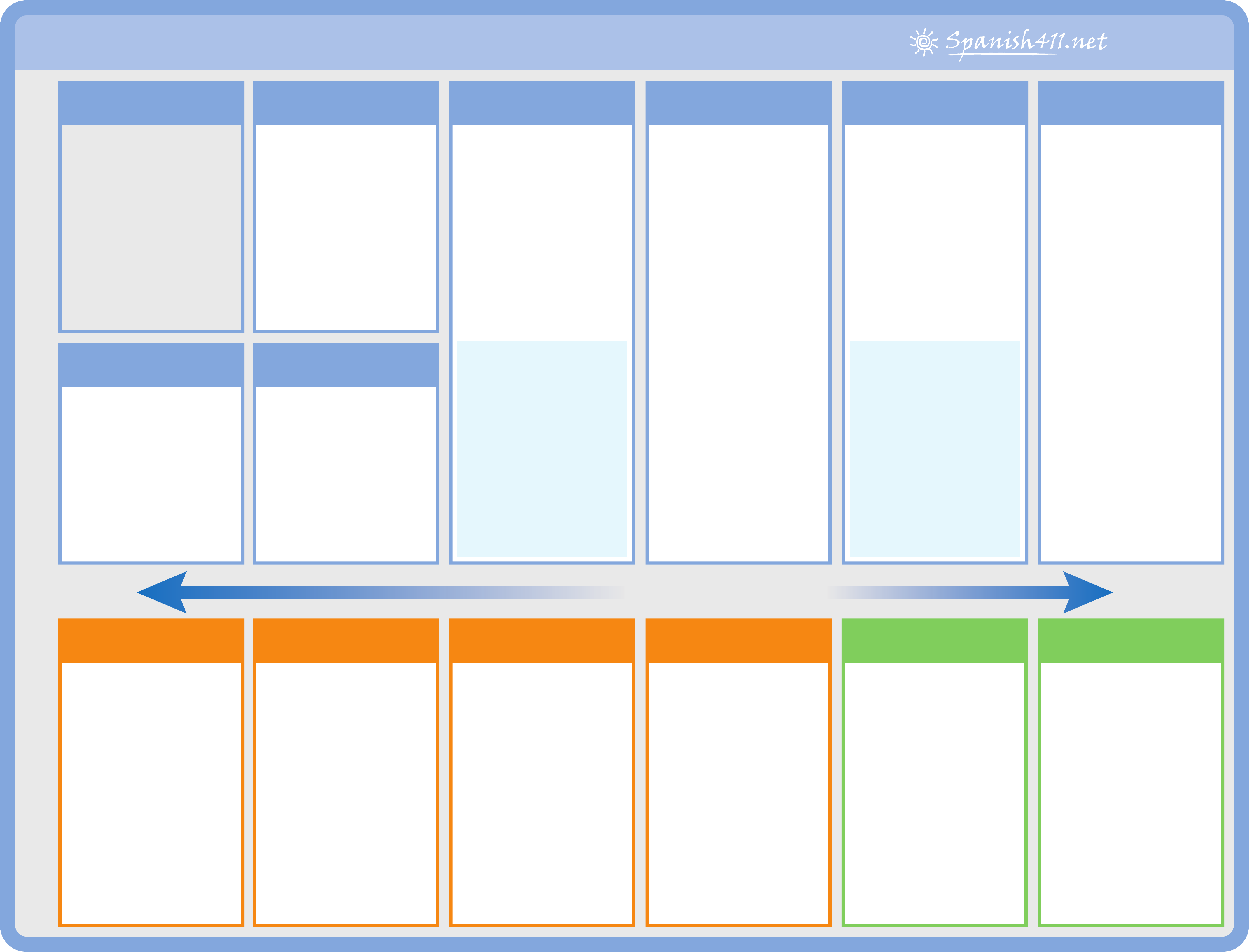
Spanish Verb Tenses
INDICATIVESUBJUNCTIVE
PRESENT FUTUREPAST
Present Perfect Present
Present Perfect Present
Yo hablo
I speak
…que yo
hable
…that I speak
…que yo
haya hablado
…that I have spoken
Yo he hablado
I have spoken
Imperfect
…que yo
hablara
or
…que yo
hablase
…that I spoke
third-person plural preterite,
drop -ron, add:
haya
hayas
haya
hayamos
hayáis
hayan
+ past participle
he
has
ha
hemos
habéis
han
+ past participle
Preterite
Yo hablé
I spoke
-ar
-é
-aste
-ó
-amos
-asteis
-aron
-er / -ir
-í
-iste
-ió
-imos
-isteis
-ieron
andar, conducir, dar, decir, estar,
hacer, ir, poner, poder, querer,
saber, ser, tener, traer, venir, ver,
yo-form spelling changes, stem
changers, i→y spelling changes
first-person present,
drop -o, add:
dar, estar, haber, ir, saber, ser
-car→que, -gar→gue, -zar→ce,
-cer→za, -ger/-gir→ja, -guir→ga,
-guar→güe, -uir→ya, quir→ca
-ar
-e
-es
-e
-emos
-éis
-en
-er / -ir
-a
-as
-a
-amos
-áis
-an
(the Preterite Perfect is not
used in spoken language
and is rarely used in writing.)
(-se endings are primarily used in Spain)
Preterite Perfect
hube
hubiste
hubo
hubimos
hubisteis
hubieron
+ past participle
Yo hube hablado
I had spoken
Pluperfect
había
habías
había
habíamos
habíais
habían
+ past participle
Yo había hablado
I had spoken
-er
-o
-es
-e
-emos
-éis
-en
-ir
-o
-es
-e
-imos
-ís
-en
-ar
-o
-as
-a
-amos
-áis
-an
stem changers:
e
→ie: cerrar, empezar, entender,
pensar, perder, preferir, querer,
recomendar, sentir, tener, venir
o
→ue: almorzar, contar, dormir,
encontrar, morir, mover, mostrar,
poder, probar, resolver, volver
e
→i: corregir, decir, elegir, medir,
pedir, repetir, seguir, servir, vestir
irregular yo form:
caber, dar, estar, saber, ver
-go verbs: caer, decir, hacer,
poner, salir, tener, traer, valer, venir
-zco verbs: conducir, conocer,
obedecer, ofrecer, parecer, traducir
spelling changes:
-cer/-cir→zo, -ger/-gir→jo,
-guir→go, -quir→co, -uir→uy
other irregulars:
adquirir(i→ie), jugar(u→ue),
oler(o→hue), ir, ser, estar, oír,
reír, -iar→í, -uar→ú
abrir → abierto,
cubrir → cubierto,
decir → dicho,
escribir → escrito,
hacer → hecho,
imprimir → impreso,
morir → muerto,
poner → puesto,
resolver → resuelto,
romper → roto,
ver → visto,
volver → vuelto
past participles
-ar → -ado, -er / -ir → -ido
if a vowel precedes the ending,
add an accent. e.g. leer→leído
Pluperfect
…que yo
hubiera hablado
or
…que yo
hubiese hablado
…that I had spoken
hubiera
hubieras
hubiera
hubiéramos
hubierais
hubieran
hubiese
hubieses
hubiese
hubiésemos
hubieseis
hubiesen
+ past participle
Imperfect
Yo hablaba
I spoke
-ar
-aba
-abas
-aba
-ábamos
-abais
-aban
-er/ir
-ía
-ías
-ía
-íamos
-íais
-ían
only three irregulars:
ir→iba, ser→era, ver→veía
-ra
-ras
-ra
-ramos
-rais
-ran
-se
-ses
-se
-semos
-seis
-sen
or
or
´ ´
(hubiese forms are primarily used in Spain)
Future
(also)
Future Perfect
ConditionalConditional Perfect
Yo hablaré
I will speak
Yo voy a hablar
I am going to speak
Yo habré hablado
I will have spoken
Yo hablaría
I would speak
Yo habría hablado
I would have spoken
+ past participle
habría
habrías
habría
habríamos
habríais
habrían
+ past participle
habré
habrás
habrá
habremos
habréis
habrán
+ a + infinitive
voy
vas
va
vamos
vais
van
caber→cabr-, decir→dir-,
haber→habr-, hacer→har-,
poder→podr-, poner→pondr-,
querer→querr-, saber→sabr-,
salir→saldr-, tener→tendr-,
valer→valdr-, venir→vendr-
add to infinitive:
add to infinitive:
-é
-ás
-á
-emos
-éis
-án
-ía
-ías
-ía
-íamos
-íais
-ían
same irregulars as future tense
the verb “haber”
Used by itself, Haber means
"there is” or “there are."
It can only be conjugated in the
third-person singular regard-
less of the number of objects
in the sentence.
Haber is also used as an
auxiliary verb when forming
the perfect tense. In that case
it means “to have.”
hay → there is, there are
hubo → there was, there were
había → there was, there were
habrá → there will be
habría → there would be
